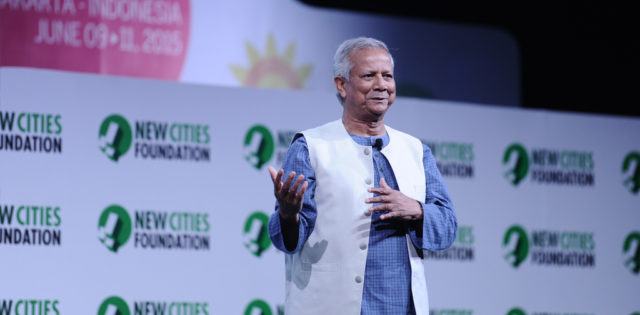Are Cities Really a Good Thing? New Cities Summit Highlights Day Two
juin 11, 2015 — Uncategorized
Urbanization is the story of the moment – but will it have a happy ending? Over the past two days at the New Cities Summit, many speakers said that cities bring greater culture, innovation, wealth, education, life expectancy and tourism, to mention just a few benefits.

The Summit never shies away from controversy, however. Yesterday morning, Nobel Peace Prize winner Muhammad Yunus stunned the audience with some sharp reminders about the downside of cities as they are currently designed.
When we talk about cities, those are the ugly spots because that’s where all the rich people live and all the poorest people
live.
“Should we have cities at all? Cities come from a previous kind of thinking: you don’t have infrastructure everywhere, so you put it all in one place,” he added. “The contribution of cities making the world unlivable is enormous. That concept of cities cannot go further – we have to redesign.”
Professor Yunus was clear: cities cannot be celebrated if they enable high inequality, and hoover up vast amounts of resources for the benefit of a very few. With massively increasing populations, there is a risk of growing challenges and resource consumption, without the promised benefits of urbanisation.

As the Mayor of Colombo, Ahamed J.M. Muzammil, said just a littler later: “I’m finding it so difficult. You cannot discourage the people coming, but the people who are living in the cities themselves do not find the facilities [they need].”
The problem of urbanization is, he said, not one for cities alone. It requires the assistance of national governments, international organizations and private companies to help build the technology, infrastructure and support networks that will enable city leaders to cope.
Three key rallying cries kept emerging throughout the day. First, cities need to be sustainable. This is both in terms of carbon emissions, but equally they must learn from Detroit and ensure that their economic model will last.
Second, they need to be more equal. Inequality is a huge problem, and cities must work to tackle these, devolving power to citizens and giving people the means to start new businesses.
And third, cities need to be affordable – not just to live in, but to build. City governments need national support, funding, and access to bond markets to raise capital for infrastructure projects, the speakers said.
Stats Roundup
Plenty more massive statistics and exciting claims emerged today. Here are some of the best:
- In Shanghai we have a population of 20 million with an additional 9 million commuters – Li Tie, Director General, China Center for Urban Development
- 50% of Indonesian people have an income below $2 – Prashant Mehra, Founder, I Got Garbage
- The global pattern is changing, 70% of the population is going to live in cities – His Worship the Mayor, Colombo, Sri Lanka
- 85 people in the world own more than half the world’s wealth – Professor Muhammad Yunus
Tweets of the Day
Here are a few of the best insights from the hashtag #ncs2015 this week:



Jakarta Urban Challenge

It would be remiss of me not to mention the brilliant Jakarta Urban Challenge.
The First Prize (US$10,000) was won by Squee Mobile App: A sharing app that unifies pedestrians and cyclists to travel together on shorter, safer non-motorized routes across Jakarta’s urban kampongs (villages).
The Second Prize (US$6,000) went to Jalan Aman (Safe Passage): A mobile application that focuses on the safety of female commuters, allowing users to share their location, report incidences of assault and access information on safe transportation options from other users.
Third Prize (US$4,000) went to the Cyclist Urban System: A plan to create dedicated “cyclist hubs” across Jakarta, where cyclists can park their bikes, get dressed, buy refreshments, repair their bikes, obtain first aid assistance and route information, and eventually rent bikes.
The Summit closed today with site visits around Jakarta, including a tour of the Kota Tua – Old Batavia, the city’s historic district; a trip to BSD City – one of Indonesia’s most ambitious urban planning projects; and a guided visit of two of Jakarta’s biggest development projects, the Mass Rapid Transit (MRT) system and the Alam Sutera mixed-used development zone.